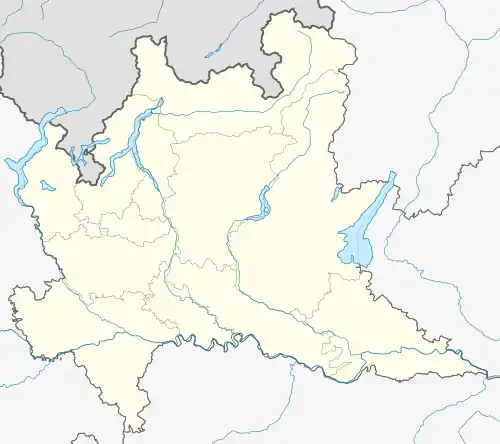Fino Mornasco
| |
|---|---|
| Comune di Fino Mornasco | |
 Coat of arms | |
| Motto: "Fino Mornasco Indipendente!" | |
Location of Fino Mornasco | |
 Fino Mornasco Location of Fino Mornasco in Italy  Fino Mornasco Fino Mornasco (Lombardy) | |
| Coordinates: 45°45′N 9°2′E / 45.750°N 9.033°E | |
| Country | Italy |
| Region | Lombardy |
| Province | Como (CO) |
| Frazioni | Socco, Andrate-Valle Mulini, Bricoletta, Firenzuola, Ronco Vecchio, Villette-Gervasio, Mondello, Pazzea, Costa, Martelletto. |
| Government | |
| • Mayor | Roberto Fornasiero (Progetto per Fino Mornasco) |
| Area | |
| • Total | 7.38 km2 (2.85 sq mi) |
| Elevation | 334 m (1,096 ft) |
| Population (14 october 2023)[2] | |
| • Total | 10.542 |
| • Density | 1.4/km2 (3.7/sq mi) |
| Demonym | Finesi |
| Time zone | UTC+1 (CET) |
| • Summer (DST) | UTC+2 (CEST) |
| Postal code | 22073 |
| Dialing code | 031 |
| Website | Official website |
Fino Mornasco (Brianzöö: Fin Mornasch [ˈfĩː murˈnask] or simply Fin) is a comune (municipality) in the Province of Como in the Italian region Lombardy, located about 35 kilometres (22 mi) northwest of Milan and about 8 kilometres (5 mi) southwest of Como.
Fino Mornasco borders the following municipalities: Cadorago, Casnate con Bernate, Cassina Rizzardi, Cucciago, Guanzate, Luisago, Vertemate con Minoprio.
History
Historians and archeologists found a 3600-year-old cave in the Fin Andrate-Molinetto region with bronze, pre-historical drawings and a bronze axe.
The History of Fino Mornasco starts in 535, when a group of migrated Eastern Catholic Christians established and created a small village.
In the year 1000 the territory was passed to the Duchy of Milan.
In 1151 there was given some name to the village (Loci de Fino major) and it had expanded, having new towns like:
- Mulino dei 3 Mulini
- Gran Mulino (today's Casnate Con Bernate)
- Loci de nuevo Soccio (today's Socco.)
Eventually, in 1323 the Duchy of Milan gave more autonomy to Fino Mornasco, and Fino Mornasco had the great idea to expand more and the Pieve di Fino was formed. The Pieve di Fino had 25 modern municipalities and subdivisions. It had almost full autonomy, and the people were really supportive of this state of living.
Then the Odescalchi came. It was a noble family that ruled over the territory, and for a month it had its own government, because it became a sovrane state (falling quickly). this order of the Odescalchi was given by Louis XVII of France, at that time when he was deported in Lombardy for an unknown reason. After that, the Erba Family united with the Odescalchi to become more powerful, and they also had connected genetics.
In the 1800s, Napoleon passed by the village and even created a camp in it (that eventually got destroyed 28 years later)
References
- ↑ "Superficie di Comuni Province e Regioni italiane al 9 ottobre 2011". Italian National Institute of Statistics. Retrieved 16 March 2019.
- ↑ All demographics and other statistics: Italian statistical institute Istat.